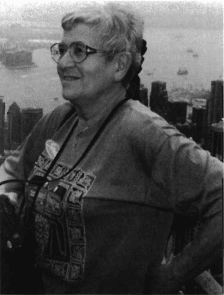Gramophone fixer dies at 100
mainGramophone reports the death of Quita Chavez, a ubiquitous oiler of wheels in the classical record industry for half of the past century.
She worked at one of London’s legendary record shops, EMG, then in the publicity department at Decca, and for the newly emerging company of Philips. In 1961 she joined the editorial department of The Gramophone. When CBS started as an independent company in the UK she went to them, lured there by Maurice Oberstein (who would finish his career as the global head of PolyGram) and later she had a second spell with Philips (by then part of PolyGram), leaving in 1980.

photo: Gramophone





Goodbye, dearest Quita. It would be difficult to equal your knowledge of recorded music, and love of intrigue. Your waspish (mostly accurate) comments on all musical matters, sense of fun, ability to spot a fraud etc.etc. made your company a joy. We really will not see your like again. Rest in peace.
May her soul rest in peace. She had a successful career and lived to a noble age!
Quita Chavez was obviously a very remarkable person. I’d never heard of her but read “Gramoophone’s” announcement of her death at age 100 and learned that she had affected my life and interests for the better. I’d like to have known her. What a life!
A fabulous lady, full of life. I am sorry to hear of her passing but happy that she lived to 100!
I wouldn’t call Quita Chavez an ‘oiler of wheels’, or a wheel-tapper for that matter. She was a highly skilled and influential A&R person who knew a vast amount about classical music. I liked her very much.
She certainly oiled dinner guests with a potent selection of spirits! She was very encouraging to me when I started writing and I hold a deep respect.
What a career; and a great lady. I was privileged to have enjoyed her respect as well. Our last encounter was a most memorable lunch with her and my long-time friends Christopher Raeburn & Charles Rodier. All three now gone.
Quita was famously forthright. During her time at Gramophone there was quite a bust-up when it was decided to fold the historicals into the main review sections. Quita was not in favour.
Come the next Gramophone Awards and my colleague Andrew Walter, receiving his disc for an EMI historical, took the opportunity to voice approval of the change. Afterwards we all drifted down from the Ritz and repaired to the Coal Hole. It was crammed, and Andy and I pinned ourselves to the wall either side of the door and chatted across people as they came in.
Quita arrived. I still recall the fixed grin of terror on Andy’s face as she turned to him and said (in that wonderful and even then old-fashioned mild cockney): ‘My dear, I’d like to cut your [redacted]ing balls off.’